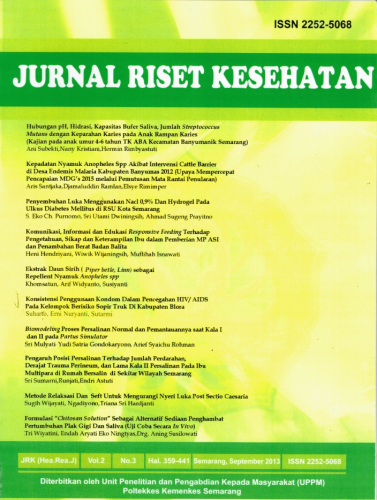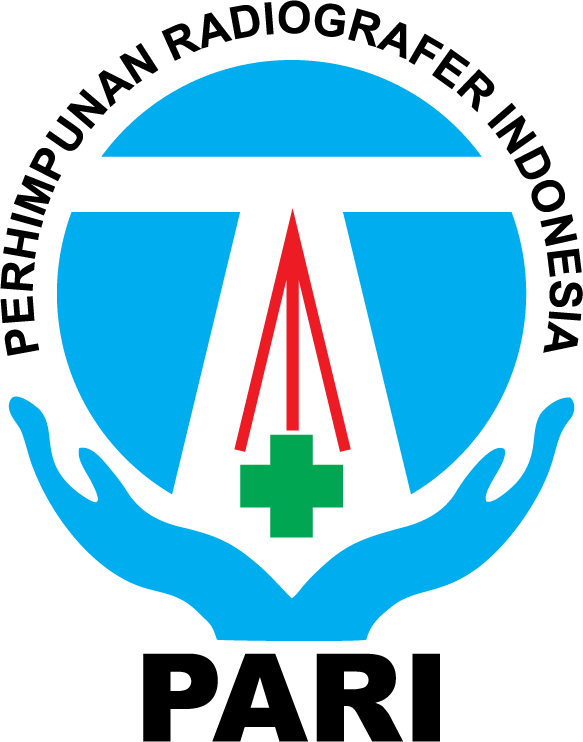ANALYSIS OF NURSE'S JOB SATISFACTION BASED ON INTERNAL SERVICE QUALITY MEASUREMENT
Abstract
Nurses who are considered by the hospital to be able to provide maximum health services to patients so that they can increase patient satisfaction. This research was conducted to analyze the job satisfaction of nurses based on Internal Service Quality in the inpatient installation of RSI A. Yani Surabaya. The study was conducted with an observational analytic design and cross-sectional approach. The study population was the nurses in the inpatient installation of RSI A. Yani Surabaya, a total of 104 nurses. The sample size was 78 nurses who were spread in each inpatient room of RSI A. Yani Surabaya. The method of sampling using simple random sampling. Data analysis was performed using binary logistic regression test. The results showed that 98.7% of nurses rated internal service quality as good and 64.1% of nurses said they were satisfied. Based on the statistical test, it was found that the value of p = 0.999 (more than 0.05), which means that internal service quality has no significant effect on job satisfaction of nurses. However, based on the aspect of internal service quality, the aspects of tools and reward and recognition can provide an almost significant effect on job satisfaction of nurses. Provision of tools has 9.23 times less risk of dissatisfying nurses than providing good tools. Likewise, giving rewards and recognition that was less likely to have a 3.34 times risk of making nurses dissatisfied compared to giving good recognition.
Keywords
Full Text:
PDFReferences
Chung, T.-L., Rutherford, B., & Park, J. (2012). Understanding Multifaceted Job Satisfaction of Retail Employees. International Journal of Retail & Distribution Management, 40(9), 699-716.
Hallowell, R., Schilesinger, L. A., & Zornitsky, J. (1996). Internal Service Quality, Customer and Job Satisfaction: Linkages and Implications for Management. Human Resource Planning, 19(2), 20-31.
Hidayat, R., & Laily, R. R. (2017). Pengaruh Program pemasaran Internal dan Kualitas Layanan Internal Terhadap Kepuasan Pelanggan Internal pada Dinas Pariwisata Kabupaten Probolinggo. Jurnal Penelitian Manajemen Terapan, 2(1), 9-17.
Hidayat, Z. (2015). Memanage Performance Karyawan Dengan Pemberian Kompensasi. Jurnal WIGA, 5(1), 18-27.
Indrayanti, A., Kadir, A. R., & Pasinringi, S. (2012). Hubungan Kualitas Pelayanan Internal terhadap Kepuasan Kerja dan Kemampuan Petugas Memberikan Pelayanan Berkualitas di RSUD Lanto dengan Pasewang, Janeponto. Makassar: Magister Manajemen Fakultas Ekonomi Universitas Hasanuddin.
Jannah, A. (2016). Analisis Penilaian Efisiensi Penggunaan Tempat Tidur Ruang Rawat Inap RSUD Tipe B di Kota Makassar Tahun 2016. Makassar: Universitas Islam Negeri Alauddin Makassar.
Malahayati, Mangara, M. T., & Khalida, S. (2013). Penilaian Dimensi Internal Service Quality dengan Menggunakan Metode Topsis untuk Peningkatan Kualitas Layanan di Rs XYZ. e-Jurnal Teknik Industri FT USU, 3(4), 1-8.
Moeheriono. (2012). Pengukuran Kinerja Berbasis Kompetensi. Jakarta: Raja Grafindo Persada.
Robbins, S. P. (2009). Perilaku Organisasi. Jakarta: Salemba Empat.
Safdar, N., Mohsin, Z., & Malik, F. A. (2014). Internal Service Quality and Job Performance: Does Job Satisfaction Mediate? Journal of Human Resources Management and Labor Studies, 2(1), 41-65.
Sharma, P., Kong, T. T., & Kingshot, R. P. (2016). Internal Service Quality as a Driver of Employee Satisfaction, Commitment and Performance – Exploring the Focal Role of Employee Well-Being. Journal of Service Management, 27(5), 1-27.
Silaban, E. J., & Andri, S. (2018). Pengaruh Motivasi Kerja dan Kepuasan Kerja Terhadap Komitmen Perawat (Kasus Rumah Sakit Ibu dan Anak Eria Bunda Pekanbaru). Jurnal Online Mahasiswa Fakultas Ilmu Sosial dan Ilmu Politik Universitas Riau, 5(1), 1-10.
Smith, C., Kendall, L. M., & Hullin, C. L. (1969). The Measurement of Satisfaction in Work and Retirement. Chicago: Rand McNally.
Supriyanto, S., & Wulandari, R. D. (2011). Manajemen Mutu Pelayanan Kesehatan. Surabaya: Pohon Cahaya.
Susanti, E. (2018). Kualitas Layanan Internal yang Memengaruhi Kepuasan Nasabah dengan Menggunakan Kualitas Layanan Eksternal Sebagai Variabel Mediasi. Jurnal Manajemen dan Pemasaran Jasa, 11(1), 95-110.
Sutarni, N. (2008). Hubungan Beban Kerja dengan Kepuasan Kerja Perawat Pelaksana di Instalasi Rawat Inap Rumah Sakit Kanker Dharmais Jakarta. Jakarta: Ilmu Keperawatan Universitas Indonesia.
Uyanto, S. S. (2009). Pedoman Analisis Data dengan SPSS. Yogyakarta: Graha Ilmu.
Wang, G. (2012). The Influence of Internal Service Quality on Employee Job Satisfaction at Taiwan- Listed International Tourist Hotels: Using Organizational Culture as The Moderator. World Transactions on Engineering and Technology Education, 10(3), 174-183.
Wirani, V., Arso, S. P., & Suryawati, C. (2017). Analisis Perbedaan Faktor yang Berpengaruh pada Kepuasan Kerja perawat PNS dan Non PNS di RSUD Prof. DR. Margono Soekarjo Purwokerto. Jurnal Kesehatan Masyarakat (Undip), 5(4), 153-163.
Wolo, P. D., Trisnawati, R., & Wiyadi, W. (2015). Faktor-Faktor yang Mempengaruhi Kepuasan Kerja Perawat Pada RSUD TNI AU Yogyakarta. Jurnal Ekonomi Manajemen Sumber Daya, 17(2), 25-34.
Wuryanto, E. (2010). Hubungan Lingkungan Kerja dan Karakterisitik Individu dengan Kepuasan Kerja Perawat di Rumah Sakit Umum Daerah Tugurejo Semarang. Jakarta: Universitas Indonesia.
Yayah, Y., & Hariyati, R. T. (2015). Iklim Kerja Berkontribusi Terhadap Kepuasan Kerja Perawat. Jurnal Keperawatan Indonesia, 18(2), 72-80.
Zeithaml, V. A. & Bitner, M. J. (2000). Service Marketing 2nd Edition: Integrating Customer Focus (2nd ed.). New York: McGraw-Hill Inc.
DOI: https://doi.org/10.31983/jrk.v9i2.6444
Article Metrics
Refbacks
- There are currently no refbacks.
Copyright (c) 2020 Jurnal Riset Kesehatan














































